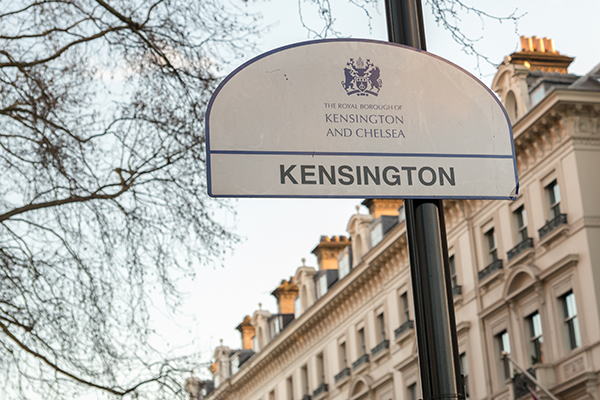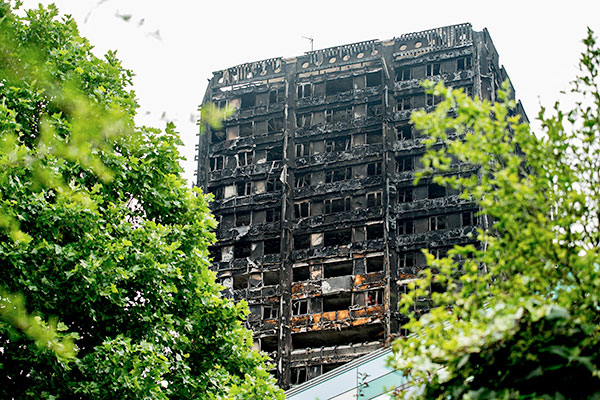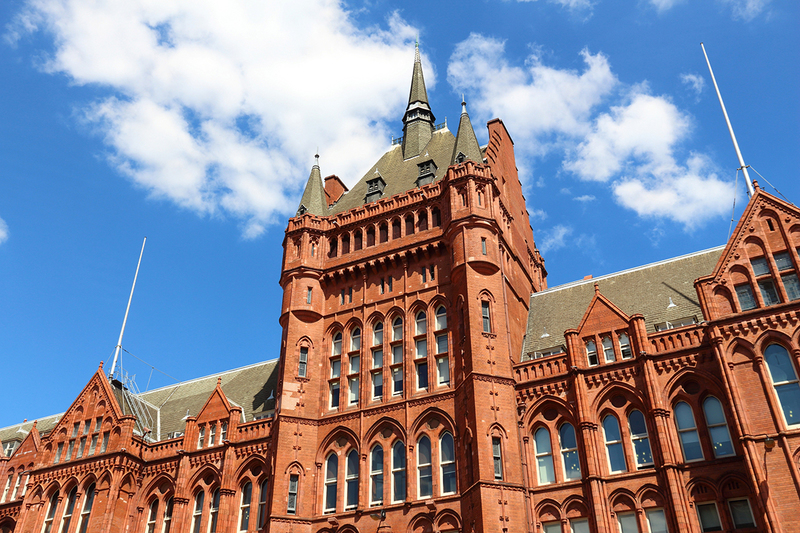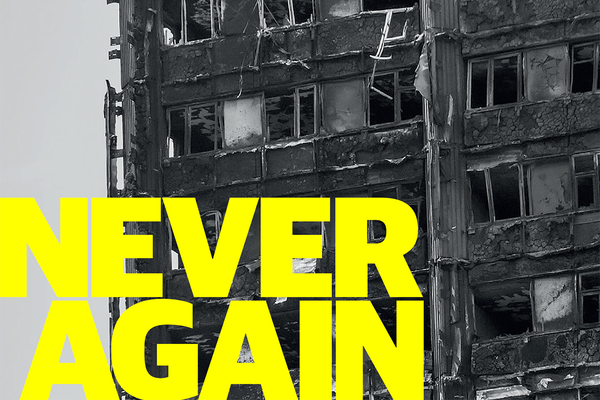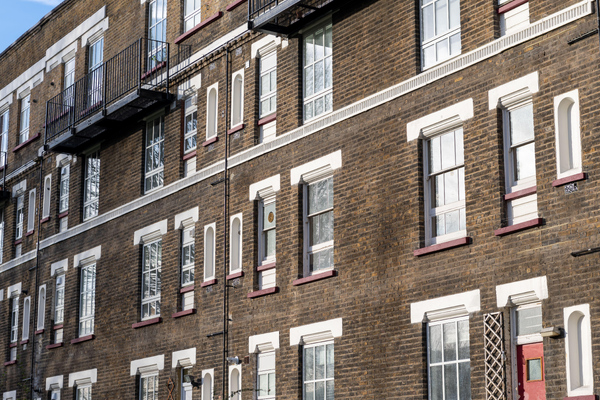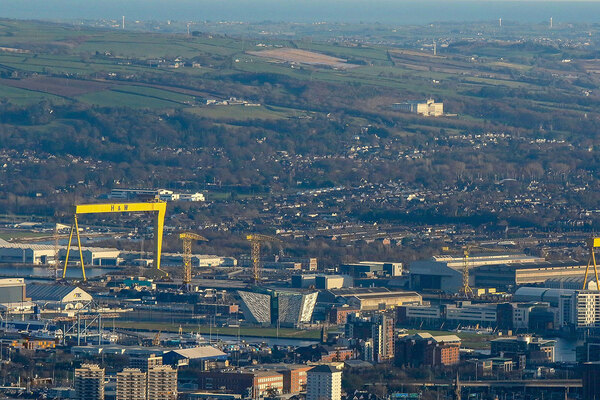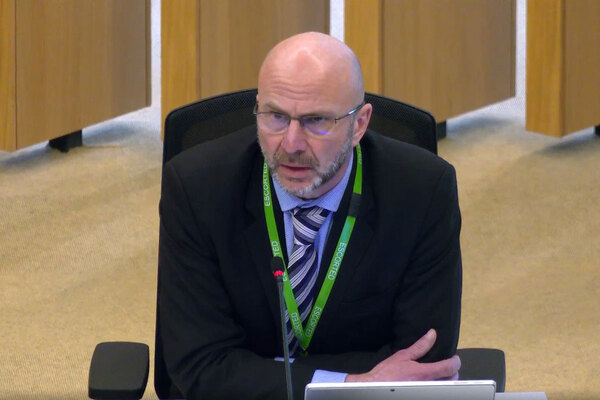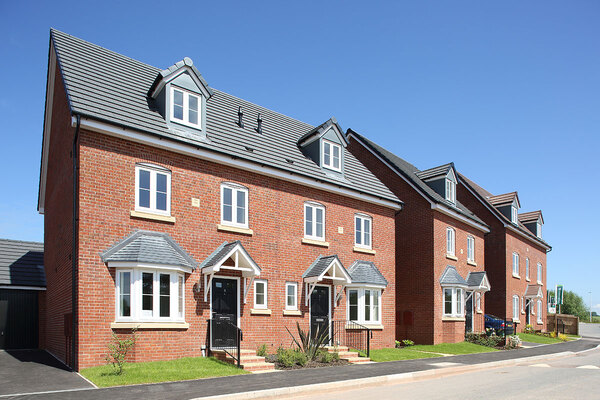You are viewing 1 of your 1 free articles
Emotions run high as Grenfell bereaved shown footage of the tower burning
An emotional second day of the Grenfell Inquiry commemorative hearings saw people leave the room in tears after footage was shown of the tower on fire.
Some of the Grenfell bereaved used their tributes at today’s hearings to express anger at the deaths of their relatives, while others shared joyful memories.
In what was a moving day for many, one person collapsed and was treated by a paramedic, and a number of people left the room in tears when footage of the burning tower was shown without warning. But relatives also shared happy memories of those they had lost in the blaze on 14 June last year.
The mother of 45-year-old Debbie Lamprell remembered her daughter as someone “who was always laughing”. They were an “incredibly close and happy family”, Debbie’s mother Miriam said in a statement read out by the director of Opera Holland Park, Michael Volpe, where Debbie worked.
Debbie started out in hospitality and moved to Grenfell Tower when she took a job at the nearby Holiday Inn. Her mother said she “always badgered” Debbie to get a council home. She added that “of course, it feels terrible now” because Debbie then moved into the flat in Grenfell Tower.
An inscribed stone has been laid at the Opera Holland Park theatre in Debbie’s memory. Her mother said if Debbie had died a “normal death” she would have “been able to hold and to comfort her”. She added that “part of me has been ripped out”.
Nicholas, the husband of Maria del Pilar Burton, known as Pily, who died in January this year, spoke movingly about their 33 years together in Grenfell Tower. They met at a Spanish disco in North Kensington, and Nicholas said she was “amazing, flamboyant and talked to everybody”.
“She was an incredibly magnetic, wonderful person but because she was a bit older than me I thought she was a bit out of my league”, he told the hearing. She was born in Colombia and moved to North Kensington in her teenage years. She spoke fluent Portuguese, Spanish, French and Italian and spoke English so well she didn’t have a trace of a Colombian accent, her husband said.
He spoke of how their relationship grew stronger: “Gradually a relationship developed and I moved in sock by sock.”
She loved reggae music “a lot” and “danced to everything, you couldn’t stop her”. “She was very beautiful and could have chosen anybody really, I don’t know why she chose me.”
Pily lost her father and mother in a short space of time and then heard that her brother had been killed in a road accident – something she never fully recovered from, her husband said. Shortly after this she was diagnosed with dementia and her condition became so bad she had to stop working.
On the night of the fire Pily and her husband fell asleep on the sofa watching a DVD, and when they woke the building was on fire. Her husband couldn’t carry her down the 40 flights of stairs so they had to wait to be rescued. Pily survived the fire that night but later died in a care home after suffering a brain haemorrhage “which caused a massive stroke”. She died on 29 January this year.
Rania Ibrahim was born in southern Egypt. She moved to the UK in 2009 and lived with her two daughters, five-year-old Fethia, known as ‘Fou Fou’ and three-year-old Hania, who also died in the fire and her husband on the 23rd floor of Grenfell Tower. Rania’s sister, Rasha, said in a statement read out by a translator: “After that terrible night came a cruel time of false hopes and rumours”, with months of uncertainty before her sister’s and nieces’ bodies were identified and they were buried.
Her fondest memory of the family is a play fight they had where the women and their children were throwing eggs at each other. “We were very connected and very alike,” Rasha said. “I still write to her and talk to her even though she’s departed”.
Rasha said her sister was “happiness walking on earth” and kind “to the point that if she wore something expensive and you liked it she would take it off and give it to you”.
The family of Mary Mendy and Khadija Saye, who were remembered by two other family members yesterday, paid tribute to them.
Mary Mendy’s cousin, Damel Carayol, presented Sir Martin Moore-Bick with a painting of the burnt shell of Grenfell Tower. Sir Martin thanked him and added: “As I have said more than once, we shall work until the truth is laid bare.”
More from the Grenfell Inquiry
Holborn Bars, London, where the inquiry sessions are taking place
Here are all our reports from the Grenfell Inquiry so far:
30 May: Grenfell Council 'recognised it should not house disabled victim above four storeys'
29 May: Anger on day six of the Grenfell Inquiry
25 May: Grenfell families 'forced to live in chimney with stay put policy'
24 May: Grenfell family complained about father being housed on 17th floor
23 May: Tributes to children on third day of Grenfell hearings
22 May: Emotions run high as Grenfell bereaved shown footage of the tower burning
Sirria Choucair lived in flat 191, across the corridor from her daughter, Nadia, her husband Bassem, and their three daughters – 13-year-old Mierna, 11-year-old Fatima and three-year-old Zaynab. Sirria was born in Lebanon and came to the UK in the 1970s. She had no education in Lebanon so when she arrived in the UK she enrolled at a local college and learned English.
She worked at the Royal Marsden Hospital catering department, and her supervisor was Pily (mentioned above), who also lived in the tower. Her son Hisam said “no one worked harder or cared for their children more”, and that she would prepare Lebanese dishes from scratch hours before the children woke up in the morning, before heading to work.
Her daughter Nadia was a “great socialiser” and knew many people in the area, Hisam said. Her husband, Bassem, was “incredibly conscientious” and only cared about providing for his family.
The family loved living in Grenfell Tower, but “all that changed’ when the refurbishment was carried out. There were problems with the contractors and council, and the lifts broke down often.
Hisam said the family tried to buy their flat but no bank would give them a deposit when they heard they lived on the 22nd floor. “This led me to believe they knew something about high rise social housing,” he said.
In the final tribute of the day, 57-year-old Hesham Rahman was remembered by his sister and two nephews as a “wonderful” hairdresser who loved writing poetry. His sister, Noha, said: “We are so lost without him”.
Hesham’s nephew, Karim Mussilhy, gave a powerful speech where he said the “smudged fingerprints” of adults and children on the walls of the tower “will stay with me forever”.
He said many more buildings across the country have the same cladding that killed his uncle, and it has taken the government nearly a year to commit to removing it. He received a standing ovation from many in the audience (continues below)
Never Again campaign
In the days following the Grenfell Tower fire on 14 June 2017, Inside Housing launched the Never Again campaign to call for immediate action to implement the learning from the Lakanal House fire, and a commitment to act – without delay – on learning from the Grenfell Tower tragedy as it becomes available.
One year on, we have extended the campaign asks in the light of information that has emerged since.
Here are our updated asks:
GOVERNMENT
- Act on the recommendations from Dame Judith Hackitt’s review of building regulations to tower blocks of 18m and higher. Commit to producing a timetable for implementation by autumn 2018, setting out how recommendations that don’t require legislative change can be taken forward without delay
- Follow through on commitments to fully ban combustible materials on high-rise buildings
- Unequivocally ban desktop studies
- Review recommendations and advice given to ministers after the Lakanal House fire and implement necessary changes
- Publish details of all tower blocks with dangerous cladding, insulation and/or external panels and commit to a timeline for remedial works. Provide necessary guidance to landlords to ensure that removal work can begin on all affected private and social residential blocks by the end of 2018. Complete quarterly follow-up checks to ensure that remedial work is completed to the required standard. Checks should not cease until all work is completed.
- Stand by the prime minister’s commitment to fully fund the removal of dangerous cladding
- Fund the retrofitting of sprinkler systems in all tower blocks across the UK (except where there are specific structural reasons not to do so)
- Explore options for requiring remedial works on affected private sector residential tower blocks
LOCAL GOVERNMENT
- Take immediate action to identify privately owned residential tower blocks so that cladding and external panels can be checked
LANDLORDS
- Publish details of the combinations of insulations and cladding materials for all high rise blocks
- Commit to ensuring that removal work begins on all blocks with dangerous materials by the end of 2018 upon receipt of guidance from government
- Publish current fire risk assessments for all high rise blocks (the Information Commissioner has required councils to publish and recommended that housing associations should do the same). Work with peers to share learning from assessments and improve and clarify the risk assessment model.
- Commit to renewing assessments annually and after major repair or cladding work is carried out. Ensure assessments consider the external features of blocks. Always use an appropriate, qualified expert to conduct assessments.
- Review and update evacuation policies and ‘stay put’ advice in the light of risk assessments, and communicate clearly to residents
- Adopt Dame Judith Hackitt’s recommended approach for listening to and addressing tenants’ concerns, with immediate effect
CURRENT SIGNATORIES:
- Chartered Institute of Housing
- G15
- National Federation of ALMOs
- National Housing Federation
- Placeshapers
Hisam said the family tried to buy their flat but no bank would give them a deposit when they heard they lived on the 22nd floor. “This led me to believe they knew something about high rise social housing,” he said.
In the final tribute of the day, 57-year-old Hesham Rahman was remembered by his sister and two nephews as a “wonderful” hairdresser who loved writing poetry. His sister, Noha, said: “We are so lost without him”.
Hesham’s nephew, Karim Mussilhy, gave a powerful speech where he said the “smudged fingerprints” of adults and children on the walls of the tower “will stay with me forever”.
He said many more buildings across the country have the same cladding that killed his uncle, and it has taken the government nearly a year to commit to removing it. He received a standing ovation from many in the audience.
